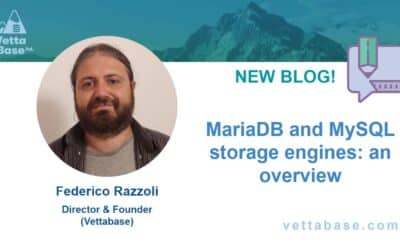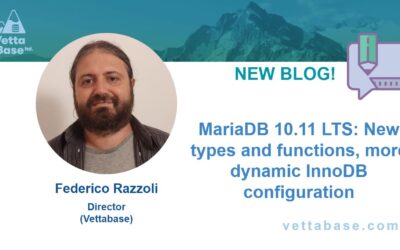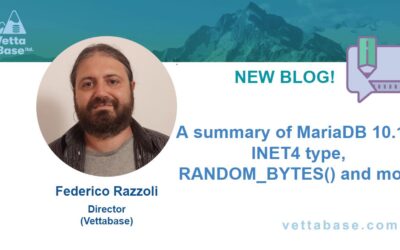MariaDB and MySQL support several storage engines. See MariaDB and MySQL storage engines: an overview for a discussion about existing MariaDB and MySQL storage engines. Here we'll see how to work with them. We'll see how to obtain information about storage engines,...
Federico Razzoli
MariaDB and MySQL storage engines: an overview
MySQL was the first DBMS to introduce the concept of storage engines in the early 2000s. This was one of its main features. Later, MariaDB extended the storage engine API and included some storage engine maintained by third parties as part of its official...
Treedom: assistance with MySQL in the cloud + ProxySQL on Kubernetes
[dsm_icon_divider image="https://vettabase.com/wp-content/uploads/2022/11/Vetta-Base-Ltd-Divider-Icon-black.png" image_max_width="18%" color="#000000" divider_position="flex-end" divider_weight="3px" icon_gap="20px" _builder_version="4.24.0" _module_preset="default"...
The UUID data type in MariaDB
MariaDB introduced the UUID data type in version 10.7. The first long-term support (LTS) version to include it is 10.11, which was declared stable in February 2023. In this article we will discuss how to use the UUID type, and why it is often wise to use it as a...
Recent MariaDB Features to learn for a happy life
Federico Razzoli at MariaDB Server Fest 2022
Vettabase Featured Customer Deep Space
MariaDB 10.11 LTS: New types and functions, more dynamic InnoDB configuration
MariaDB 10.11 is now Generally Available (GA), or stable if you prefer. It is a Long Term Support (LTS) version, so it is recommended for production use. As I do for every new stable version, here I'm writing my review of MariaDB 10.11. Maturity level As mentioned,...
A summary of MariaDB 10.10: INET4 type, RANDOM_BYTES() and more
In my first post in 2023, I want to give you a summary of MariaDB 10.10. Some may argue that I'm a bit late because it was released last November, and versions 10.11 and 11.0 have been announced since then... All that is correct, but 10.10 is the latest stable...
Cassandra: How to run a query with Maximum Consistency
Cassandra consistency levels are a tricky concept, until you familiarise with them. They're based on a simple consideration: not all data and not all queries require the same level of correctness. By default: data changes are written to only one node for better...
How to compose strings in MariaDB
MariaDB supports several ways to compose strings dynamically. Some of them might be well-known, others aren't familiar to you. This article covers all the ways to compose strings. CONCAT() CONCAT() is a simple function to concatenate strings: > SELECT CONCAT(user,...









